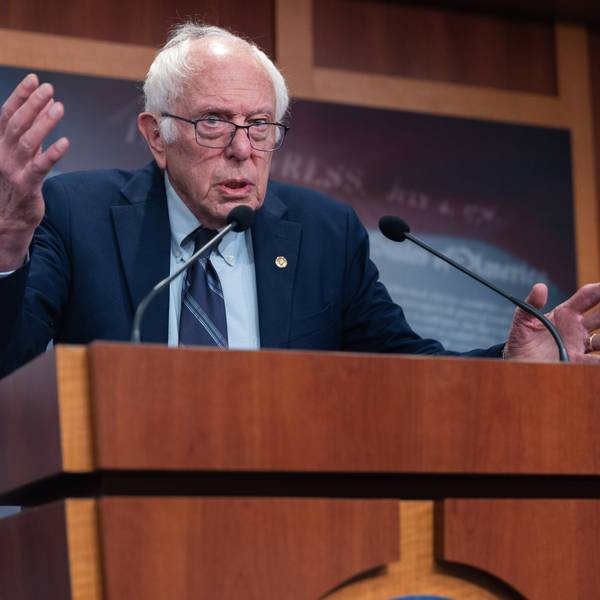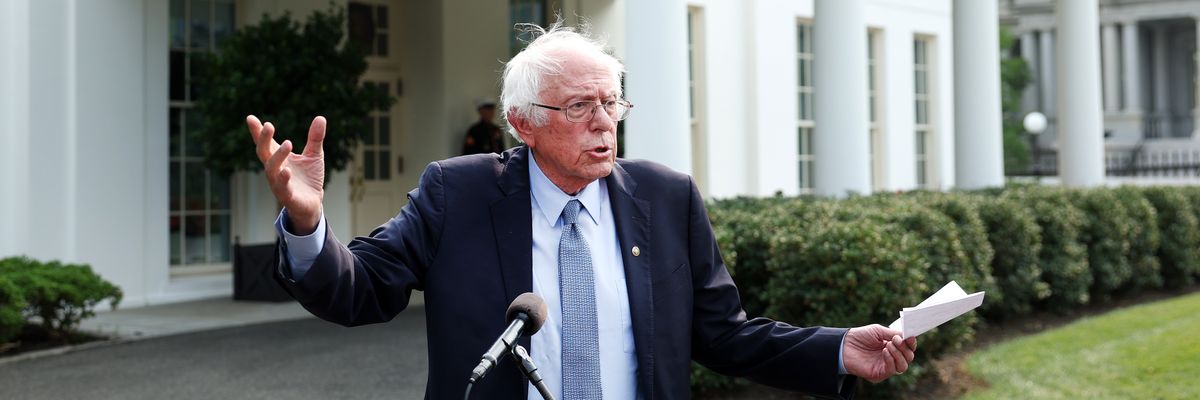U.S. Sen. Bernie Sanders on Wednesday blocked passage of Republican legislation that he warned would worsen the humanitarian crisis in the Gaza Strip, which has been bombarded by Israeli forces for the past 12 days in retaliation for a major Hamas attack.
Sanders (I-Vt.) objected to an attempt by Sen. Rick Scott (R-Fla.) to pass by unanimous consent his
Stop Taxpayer Funding of Hamas Act, which would prohibit aid to Gaza until the president certifies to congressional committees that the funds won't benefit members of Hamas or any other organization the U.S. government has designated as a terrorist group.
As Scott's office
highlighted in a statement when he introduced the bill earlier this year, it would also ensure that "U.S. funds are not authorized for expenditure in the territory of Gaza through any United Nations entity or office that the president cannot certify is not encouraging or teaching anti-Israel and antisemitic ideas and propaganda."
Speaking on the Senate floor for six-and-half minutes on Wednesday, Sanders condemned "the barbarous attack" by Hamas that left over 1,400 Israelis dead and affirmed that "the state of Israel has the absolute right to defend itself against Hamas and terrorism in general."
Recent Israeli airstrikes have
killed at least 3,478 Palestinians and devastated civilian infrastructure in Gaza—of which Hamas seized control in 2007. Israel has imposed a blockade of the occupied Palestinian territory since then and announced a "complete siege" following Hamas' October 7 attack, cutting off 2.3 million people from basic necessities. The Israeli operation has sparked claims of genocide.
Sanders urged fellow senators to recognize that "right now there are hundreds and hundreds of thousands of innocent men, women, and children in Gaza who have lost their homes... They have no food. They have the water. They have no fuel... Half of those people are children."
Before this war, "Gaza was one of the most desperately poor places in the world," the senator stressed. "What our country must not be involved in is making the horrific and miserable situation in Gaza even worse."
The United Nations Relief and Works Agency for Palestine Refugees in the Near East (UNRWA) is now
sheltering more than 513,000 Palestinians, or about a fourth of Gaza's entire population, at U.N. facilities across the 140-square-mile strip that "are overcrowded and have very limited supplies of food, hygiene, and cleaning supplies and potable water." The shelters have also been impacted by Israeli bombings.
"We have got to do everything that we can to make sure that not one nickel goes to the murderous Hamas organization. But at the same time we have got to stand with the innocent women and children in Palestine who are suffering today and are facing an almost unprecedented modern humanitarian disaster," Sanders argued. "Today, in the midst of this crisis, U.S. and U.N. assistance in Gaza is aimed squarely at addressing the basic needs of the Palestinian people, including humanitarian aid and water and health programs."
Noting the long history of conflict between Israelis and Palestinians, the senator—who said a few years ago that he is "proud to be Jewish" but "not actively involved in organized religion" and briefly lived in Israel in the 1960s—added that "this is a tough issue. There have been four wars in the last 15 years. It ain't gonna be solved tomorrow. But while we do our best to support Israel and destroy Hamas, please, let us not turn our back on the suffering people in Gaza. This is not what we should be doing, not what Congress should be doing, and therefore I object."
Sanders pointed out the lengths to which the U.S., U.N., and others already go to ensure that humanitarian aid is not diverted to groups such as Hamas, and highlighted that some assistance may finally get into Gaza soon, after pressure from the United States—which provides Israel with $3.8 billion in annual military support.
Democratic U.S. President Joe Biden
said in Israel on Wednesday that "I asked the Israeli cabinet—who I met with for some time this morning—to agree to the delivery of lifesaving humanitarian assistance to civilians in Gaza. Based on the understanding that there will be inspections and that the aid should go to civilians, not to Hamas, Israel agreed that humanitarian assistance can begin to move from Egypt to Gaza."
The office of Israeli Prime Minister Benjamin Netanyahuconfirmed that "in light of President Biden's request, Israel will not prevent the flow of humanitarian aid from Egypt as long as it is food, water, and medical supplies for the Palestinian population in the southern Gaza Strip and as long as it doesn't go to Hamas. Any aid diverted to Hamas will be prevented."
The White House also
announced that through trusted partners including U.N. agencies, "the United States is providing $100 million in humanitarian assistance for the Palestinian people in Gaza and the West Bank" which "will help support over a million displaced and conflict-affected people with clean water, food, hygiene support, medical care, and other essential needs."
The Biden administration has come under fire for reportedly discouraging the use of terms such as "de-escalation/cease-fire," and not strongly and publicly pressuring Israeli forces to not kill civilians in Gaza, including Palestinian Americans who are still there.
Hundreds of Jewish Americans and allies were
arrested at the U.S. Capitol on Wednesday during a protest demanding members of Congress push for an immediate cease-fire in Gaza, which followed similar arrests at the White House earlier this week.




